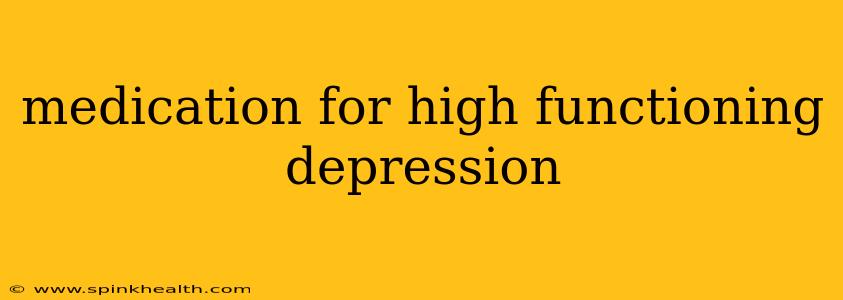Navigating the Landscape of High-Functioning Depression: Finding the Right Medication
The quiet struggle of high-functioning depression is often unseen, a hidden battle fought behind a facade of normalcy. Many individuals manage to maintain careers, relationships, and a semblance of a fulfilling life, all while grappling with the persistent weight of depression. But the internal turmoil can be immense, leaving them feeling exhausted, drained, and desperately seeking relief. If this resonates with you, understanding medication options for high-functioning depression is a crucial first step. This isn't a one-size-fits-all solution, and finding the right medication requires patience and collaboration with a mental health professional.
This isn't just about managing symptoms; it's about reclaiming your life and rediscovering joy. Let's explore the complexities of treating high-functioning depression and the various medication avenues available.
What are the common symptoms of high-functioning depression?
High-functioning depression, also sometimes referred to as masked depression, presents differently than classic depression. It's characterized by a subtle yet persistent sadness, fatigue, and difficulty concentrating. Individuals might outwardly appear successful and well-adjusted, masking their internal struggle. They might still maintain their routines and responsibilities, but with significantly diminished emotional capacity and a profound sense of emptiness. This often leads to a delayed diagnosis as individuals, and sometimes even their loved ones, miss the subtle cues. They might struggle with feelings of worthlessness and hopelessness, but effectively conceal these feelings from the outside world.
What types of medication are typically used to treat high-functioning depression?
There's no single "best" medication for high-functioning depression. The most effective approach often involves a combination of factors, including lifestyle adjustments and therapy. That said, several types of medication are frequently prescribed:
-
Selective Serotonin Reuptake Inhibitors (SSRIs): These are often the first line of defense against depression. SSRIs work by increasing the levels of serotonin in the brain, a neurotransmitter that plays a crucial role in mood regulation. Common examples include sertraline (Zoloft), fluoxetine (Prozac), and escitalopram (Lexapro).
-
Serotonin-Norepinephrine Reuptake Inhibitors (SNRIs): SNRIs boost both serotonin and norepinephrine, another neurotransmitter involved in mood and energy levels. Venlafaxine (Effexor) and duloxetine (Cymbalta) are common examples.
-
Atypical Antidepressants: This category encompasses a variety of medications with diverse mechanisms of action. Bupropion (Wellbutrin), for example, is unique in that it doesn't significantly affect serotonin levels, making it a potential option for individuals who experience certain side effects with SSRIs or SNRIs.
-
Other Medications: In some cases, other medications, such as mood stabilizers or anti-anxiety medications, might be used in conjunction with antidepressants to address specific symptoms or co-occurring conditions.
How long does it take for medication to work for high-functioning depression?
It's important to understand that medication isn't a quick fix. It often takes several weeks, sometimes even months, to experience the full therapeutic effects of antidepressants. Patience is crucial. Regular check-ins with your psychiatrist are essential to monitor your progress, adjust dosages, or explore alternative options if needed. Don't be discouraged if you don't see immediate results; it's a process that requires time and consistent effort.
What are the potential side effects of medication for high-functioning depression?
Every medication carries potential side effects, and antidepressants are no exception. Common side effects can range from mild (e.g., nausea, headache, sleep disturbances) to more serious (e.g., changes in libido, weight fluctuations). Your doctor will discuss these possibilities with you, and it's vital to report any concerning side effects promptly. Remember, many side effects are manageable, and your doctor can help you find ways to mitigate them.
Is therapy necessary alongside medication for high-functioning depression?
While medication can significantly alleviate symptoms, therapy often plays a crucial role in addressing the underlying causes of depression and developing coping mechanisms. Therapy, particularly cognitive behavioral therapy (CBT), can help you identify negative thought patterns, develop healthier coping strategies, and work towards long-term well-being. The combination of medication and therapy offers a holistic approach that often yields the best results.
This information is for general knowledge and shouldn't be considered medical advice. Finding the right treatment plan for high-functioning depression is a deeply personal journey, and requires close collaboration with a mental health professional. They can accurately diagnose your condition, understand your unique needs, and guide you in selecting the most appropriate treatment strategy. Don't hesitate to seek professional help; your well-being is invaluable.

